March 1918
Germany gambles all on the Western Front
March 1
Germans Move Deeper into Russia Unopposed
Following the collapse of the peace negotiations at Brest-Litovsk, the Germans have declared that the armistice that has been in place between the Central Powers and Russia is null and void. As a result, the Germans have resumed their advance into Russia, for the most part unopposed.
German forces are now within 90 miles of Riga, and Austrian and Ukrainian troops are nearing Kiev, the Ukrainian capital, now held by the Bolsheviks. Polish legionnaires aided the Germans in occupying Minsk. The Germans are taking no prisoners, merely disarming the Russians and liberating them. In the last two days the Germans
have not been met with a single case of resistance.
The Bolshevik commander says that if the people succeed in throwing against the enemy concentrated masses of revolutionary citizens, who will struggle for every town, village, street and house, then there is no force the Germans can successfully bring against them. He says that all available able-bodied men must be ordered to
work on fortifications and in the construction of obstacles along all the routes of the German advance. "Any bourgeois who resist must be tried, forcibly compelled to work, and if unwilling to work, shot. Revolutionary discipline," the commander said, "must be brought to the highest degree of efficiency by the handing over to the revolutionary
tribunals all who do not obey the order."
However, a dispatch from Petrograd indicates that the majority of Russians would welcome the arrival of the Germans, fearing an outbreak of uncontrolled anarchism, with riots and murders. The bulk of the Russian population is tired of revolution, hunger, disorder and the uncertainty perpetually overhanging them, declaring that
they are experiencing all the disadvantages of the Czar’s regime without any of the benefits.
If the dispatches from Petrograd gauge the situation accurately, the Germans are likely to find little difficulty in occupying the city. Russian soldiers quite frankly refuse to fight and say that they have had enough of the fighting.
German airplanes, meanwhile, are distributing proclamations calling on the Russian people to remain calm and keep order, as the Germans are coming to suppress anarchy and bring food as soon as possible.
Germany Issues New Peace Terms to Russia
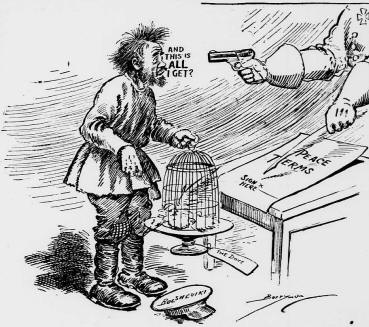 Germany says it will conclude peace with Russia on the following conditions: 1) both sides will declare the war ended; 2) all regions west of the line indicated at Brest-Litovsk to the Russian delegation, which formerly belonged to Russia, will
no longer be under the territorial protection of Russia; 3) Russia renounces claim to intervention in the eternal fares of these regions; 4) Germany and Austria are to define the fate of these regions in agreement with their populations; 5) after the completion of Russian demobilization, Germany will evacuate the regions which are east of the above
line; 6) Livonia and Estonia must be immediately cleared of Russian troops and Red Guards. Livonia and Estonia will be occupied by German police until the date when a constitution of the respective countries shall guarantee their security; 7) Russia will conclude peace with Ukrainian People's Republic and recognize its independence; 8) Finland will
be immediately evacuated by Russian troops and Red Guards; 9) Russia will do all in its power to secure for Turkey the orderly return of its Anatolian frontiers; 10) Russia will recognize the annulations of the Turkish capitulation of 1905; and 10) Russia will completely demobilize the Russian army immediately.
Germany says it will conclude peace with Russia on the following conditions: 1) both sides will declare the war ended; 2) all regions west of the line indicated at Brest-Litovsk to the Russian delegation, which formerly belonged to Russia, will
no longer be under the territorial protection of Russia; 3) Russia renounces claim to intervention in the eternal fares of these regions; 4) Germany and Austria are to define the fate of these regions in agreement with their populations; 5) after the completion of Russian demobilization, Germany will evacuate the regions which are east of the above
line; 6) Livonia and Estonia must be immediately cleared of Russian troops and Red Guards. Livonia and Estonia will be occupied by German police until the date when a constitution of the respective countries shall guarantee their security; 7) Russia will conclude peace with Ukrainian People's Republic and recognize its independence; 8) Finland will
be immediately evacuated by Russian troops and Red Guards; 9) Russia will do all in its power to secure for Turkey the orderly return of its Anatolian frontiers; 10) Russia will recognize the annulations of the Turkish capitulation of 1905; and 10) Russia will completely demobilize the Russian army immediately.
In addition, the Germans have demanded that Russian warships in the Black Sea, the Baltic Sea, and the Arctic Ocean immediately return to their homeports and be disarmed. Warships of the Allies, which are in the sphere of Russian authority, must be interned and not allowed to return to sea.
Bolsheviks Accept German Peace Terms
At a stormy meeting of the Council of Workmen’s and Soldiers Delegates on Tuesday, Premier Lenine urged acceptance of the German terms. "Our enemies’ knees are on our chest and our position is hopeless," declared Lenine in the course of his long speech to the Central Executive Committee, in which he insistently urged the
acceptance of the peace conditions, however oppressive and unfortunate they may appear. "This peace must be accepted as a respite," he continued, "enabling us to prepare a decisive resistance to the bourgeois and imperialist. The proletariat of the whole world will come to our aid. Then we shall renew the fight."
Opponents to the peace treaty countered that the proposed peace meant the end of Russia, so far as her political independence was concerned, and that the day after the signing of the peace the Russian government would be in bondage to Germany. The Bolshevik delegation voted practically as a unit in support of the treaty while
the Social Revolutionary members fought against acceptance of the terms and insisted upon the immediate assembly of the new Constitutional Assembly and to allow it to decide the acceptance of Germany’s peace terms.
Acceptance by the Bolshevik government of the German peace terms came without the support of Leon Trotsky, the Bolshevik Foreign Minister, who had made it clear he was opposed to the treaty.
March 8
Russia and Romania Sign German Peace Terms
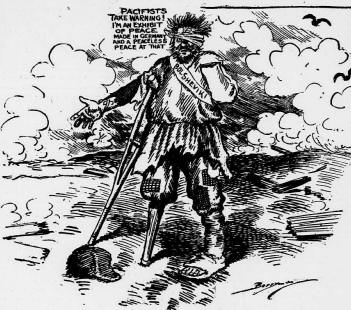 On Tuesday the Bolsheviks formally signed the German peace terms at Brest-Litovsk. Germans have reacted to the peace treaty with Russia with joy. Flags are flying everywhere and the schools have been given a holiday. Meanwhile, a new Siberian
Council of Workmen's and Soldiers Delegates has determined not to recognize any imperialistic German peace and has organized its own army to continue the fight.
On Tuesday the Bolsheviks formally signed the German peace terms at Brest-Litovsk. Germans have reacted to the peace treaty with Russia with joy. Flags are flying everywhere and the schools have been given a holiday. Meanwhile, a new Siberian
Council of Workmen's and Soldiers Delegates has determined not to recognize any imperialistic German peace and has organized its own army to continue the fight.
In spite of the peace treaty, the German advance into the interior of Russia continued in full swing. Troops are reported to be moving along the railway from Minsk with the object of cutting off Moscow. In the south, the Germans have secured their immediate objective in Ukraine in occupying Kiev, the capital of the Republic,
after a little more than a ten-day march through the country - 200 miles east from the former fighting front.
Russia has broken down just as Turkey broke down two centuries ago, just as Poland broke down a century and a half ago, and the consequences of the breakdown are again found in the actions of adjoining nations. Russia is the biggest single stretch of European territory that has been open to invasion and partition since the
Roman Empire fell. Today Russia is in the same position as the Roman Empire when at last it was no longer able to defend itself.
Germany and Austria have already occupied Poland and the Baltic provinces and are now cutting more deeply into what was Russia before the first partition of Poland. Turkey is demanding the Caucuses and all Russian territory on the Black Sea.
A peace treaty between Germany and Finland has been signed. By the conditions of the treaty, Finland agrees to cede no territory nor grant any territorial rights to any foreign power without the consent of Germany. All former Russian fortifications on the Baltic will be removed. The Finnish government has asked the German
Emperor to appoint Prince Oscar, the fifth son of the Emperor, to be King of Finland.
Meanwhile, a preliminary peace treaty has been signed between the Central Powers and Romania. Under the terms of the treaty Romania will allow the transport of German troops through Moldavia to Odessa. The Romanians also agreed to evacuate all the remaining fortifications along the Austrian-Hungarian border. The Romanian
government also agreed to immediately demobilize the Romanian army. The demobilization will take place under the supervision of the German army.
Japan Invades Siberia
Japanese policy during the world war has been simple, if not entirely to the liking of the Allied nations. The Japanese were ready and willing to join with the British to eject the Germans from China.
Every European nation removed from the Chinese field represents a step in the direction of the realization of Japanese ambition to dominate the Far East and eliminate all European rivals. But when the question became one of sending Japanese troops to Europe to aid the Allies, Japan did not stir and will not stir unless the
compensation is sufficient: surrender by European nations, notably by Britain, all bases in the Far East.
Today, the Russian collapse offers Japan the chance to continue the work, which it was compelled to lay aside in the 1905 Manchurian War because she lacked the financial strength to push that war and faced both bankruptcy and defeat had she continued. Now, with little real fighting and with no serious opposition from the great
powers, she can resume the work of occupying Russian territory in the Far East and pushing her own frontiers back from the Pacific to Lake Baikal. That she will surrender what she takes now, under pressure too great for her to resist, is unbelievable.
By occupying eastern lands, Japan will arrive at a place where her natural interest becomes the same as the Germans and the Austrians. If Germany and Austria are able to annex much of western Russia at the close of the war, then they will fight any effort towards the rehabilitation of Russia. Japan, holding eastern Siberia and
parts of the Baltic provinces and Poland with Germany, will be opposed to anything that would contribute to the restoration of the Russian state to prevent the return of Russian pressure on all her frontiers.
It is time to face the facts. A new Eastern question has been borne out of the Russian Revolution. Russia has, through the Bolsheviks, been reduced to the condition of Poland in the latter half of the 18th century. Once Poland had become helpless, partitions began, which ended in Poland being erased from the map of Europe. It
was the common policy of all three of her despoilers: Germany, Russia and Austria, to prevent any stirring of Polish national spirit and to suppress all Polish aspirations.
Now Japan, as she occupies eastern Siberia, will inevitably come to have a common policy with the Central Powers. The addition of Japan to the German alliance, not only in the present war, but in future wars, will mean one of the most profound changes in international relations imaginable. This is a change which German writers
and statesmen have long forecast and openly sought, notably in the Zimmerman proposal before the United States entered the war.
March 16
Trotsky Resigns Leaving Lenine in Full Control
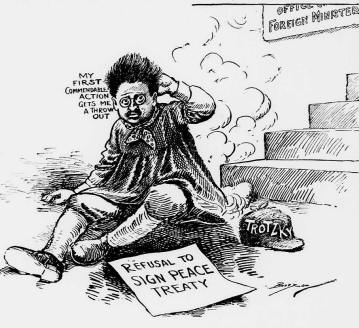 On Saturday, Leon Trotsky announced that he has resigned as Foreign Minister. Trotsky was the most important member of the revolutionary government formed after the overthrow of Kerensky last November, although Nikolai Lenine, as Premier, was
the nominal head of the Russian government. Trotsky virtually controlled Russia’s destiny up to the second peace conference at Brest-Litovsk.
On Saturday, Leon Trotsky announced that he has resigned as Foreign Minister. Trotsky was the most important member of the revolutionary government formed after the overthrow of Kerensky last November, although Nikolai Lenine, as Premier, was
the nominal head of the Russian government. Trotsky virtually controlled Russia’s destiny up to the second peace conference at Brest-Litovsk.
It was Trotsky who publicized the text of secret documents exchanged between Russia and foreign governments, and it was he who proposed the armistice to the Central Powers early in December, which eventually led to the abortive conference at Brest-Litovsk. The negotiations were disrupted in mid-February and hostilities were
renewed. The Germans then submitted partial peace terms, but Trotsky took no part in the conference.
Trotsky’s resignation is the second among the Russian leaders. On February 25 Ensign Krylenko, Commander of the Russian armies, also resigned owing to differences with the Council of People’s Commissaries and their acceptance of the peace terms. The withdrawal of Trotsky and Krylenk leaves Lenine as the only survivor of the
Bolshevik ruling triumvirate.
It is reported that Trotsky was dismissed by Lenine, owing to a quarrel over the German peace terms. Trotsky held that the piece had been extorted by force. Therefore, he is reported to have said it was Russia's duty to fight, if only guerrilla warfare, and the German treaty should not be ratified. Lenine, on the other hand,
held that the treaty must be ratified and carried out on the theory that disastrous treaties do not necessarily annihilate nations as history has proved several times.
Lenine, in an article against the Bolsheviks who refused to ratify the peace treaty, declared that "the terms Napoleon imposed upon Prussia and Germany were tenfold heavier than Germany is imposing on Russia. We have concluded another Tilsit peace," he said. "We shall yet arise to victory, even as Germany, after Tilsit, rose
and delivered itself from Napoleon."
German Turns Focus to Invading India
Tardily, the world is beginning to recognize the real meaning of the German partitions of Russia. As a result of the peace treaty, Germany has acquired a railroad to the Indian front independent from the Baghdad railroad.
A generation ago, when Anglo-Russian rivalry in Asia seemed the only menace to world peace, Russian engineers were pushing a railroad line straight down to the frontier of Afghanistan for a possible attempt by the Czar to invade India through the Khyber Pass. The British at Kandahar watched the Russians approach with
ever-growing anxiety. The 1905 Sino-Japanese War changed all this, and the arrangements between Britain and Russia that same year, which divided Persia, ended the Anglo-Russian rivalry. The railroads that Russia had constructed, however, remained. One of them, leaving the Black Sea at the great oil port of Batum, passes over the Trans-Caucus region
along the Persian frontier and then east towards Afghanistan.
At the onset of the present war, Germany hoped to make use of the Baghdad railroad to reach the Persian Gulf below Baghdad, and from there, head to Basra and some of the greatest oil districts of the world. This was the prize for which both Britain and Germany gambled in the first year of the conflict. But despite numerous
setbacks, the oilfields remained in British hands. As the war progressed, British forces from India and Egypt took the offensive in Mesopotamia, and as a result, Baghdad and Jerusalem are now in British hands.
After failing in their original intentions, the Germans have turned the British flank by one of the most daring adventures. With the creation of the independent Ukraine and the fall of Romania, the Black Sea has become a German lake. The great European terminal of rail lines coming from central Europe into that sea is all in
German hands.
Possessing all the railroad lines, dominating the Black Sea, and holding the entrance through the Dardanelles, Germany is free to transport troops and war materials across the sea without fear of interference by her enemies. From Batrum she has the railroads toward the Caspian Sea, and beyond the Caspian, the old railroad
going straight down to the frontier of Afghanistan available to her.
The German scheme does not simply call for the seizure of the railroads. The Germans, with the assistance of the Turks, hope to organize the Muhammaden population in a common league against the British to the south, and to use this league as the basis of a vengeful German advance through the Hindu-Kush to Kabul and Kandahar.
But more than all else, Germany hopes to arouse the millions of Mohammedens in this region and spread unrest and rebellion, which will precede her armies on the march to India.
Unless German power over Turkey and German control of the Black Sea is broken, any peace on the Western Front will be but a prelude to a new war between Great Britain and Germany, for Germany has now laid hold of a deadly weapon that threatens the safety of the British rule in India.
March 22
Allies Prepare for German Offensive on the Western Front
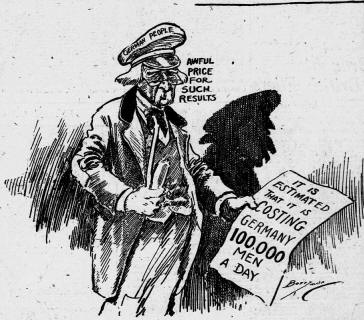 The first stage of the great German offensive on the Western Front has passed and is to be scored as a German failure, the enemy having fallen short of realizing his aims in the first great smash. After attacking all day Monday and until a late
hour Tuesday night, the Germans ceased their operations along 50 miles of the British front and had not resumed their heavy assault at the latest reports. However, British Field Marshall Haig predicted further hard fighting was ahead.
The first stage of the great German offensive on the Western Front has passed and is to be scored as a German failure, the enemy having fallen short of realizing his aims in the first great smash. After attacking all day Monday and until a late
hour Tuesday night, the Germans ceased their operations along 50 miles of the British front and had not resumed their heavy assault at the latest reports. However, British Field Marshall Haig predicted further hard fighting was ahead.
The German attack followed a heavy bombardment by the enemy on the Western Front, which began Saturday morning and continued all day Sunday. At the same time the Germans began a display of artillery activity in the Messines sector, which included bombardment with gas shells.
The artillery action on the Western Front could be distinctly heard at Dover and other towns on the east coast of England. The doors and windows of homes in Dover, for instance, were continuously shaken by the heavy concussions. The firing, which was the heaviest heard in this district for such a distance, began at three
o'clock this Saturday morning and lasted until 7 a.m..
The German attacks have been delivered in large masses and have been extremely costly to the hostile troops engaged, whose losses have been exceptionally heavy. Large numbers of German troops have been observed during the day, moving forward behind enemy lines. Captured maps depicting the enemy's intention show that he has not
obtained his objective on any part of the lack attack front.
The last report mentioned that the enemy was still being held in British battle positions, which means that the British line is still intact, although admittedly it has been bent backward at points under the terrific Teutonic assault. The battle line has not moved in only one direction, however, the British army struck back
spiritedly at the German masses and regained some of their positions which they had reportedly abandoned.
Reports indicate that the Central Powers have massed all possible forces at their disposal on the Western Front for their present drive. The prospect seems, however, that they will need every man if they are to keep up their attack long enough with anything like its initial force, as all reports indicate that the German losses
have been terrible under withering fire of the British artillery and machine guns.
The land behind the British lines is a devastated area over which the Germans retreated last March. Field Marshal von Hindenburg declared at the time that the devastation was carried out not only to hamper the Allied armies, but also to provide a battlefield for the future.
March 29
Germans Pierce British Lines
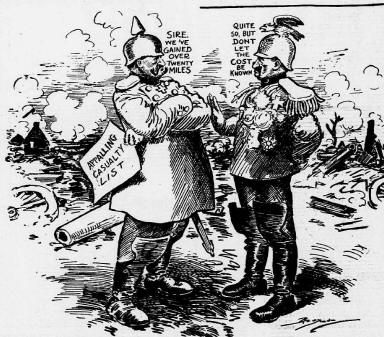 After two days of terrific battling in their greatest offensive on the Western Front, the Germans have finally succeeded in bringing the action at one point on the front somewhat more into the open.
After two days of terrific battling in their greatest offensive on the Western Front, the Germans have finally succeeded in bringing the action at one point on the front somewhat more into the open.
The British defensive system at St. Quentin has been pierced on a 50-mile front. It was broken through by the great weight of the enemy infantry and artillery. The British are falling back in good order. Berlin claims to have captured 25,000 British forces.
Assaulting the British lines, the Germans have forced their way forward over the British front approximately twenty-one miles in length, and had penetrated to a depth of four or five miles. The great German offensive has developed a salient feature as a result of an apparently desperate effort to drive a wedge between the
British and the French and push on across the Somme Canal in the general direction of Paris. A supreme effort by the Germans to cut the line in this region is forecast. The German advances are accompanied by terrible slaughter, as Germans in their mass formations are being cut to pieces by British guns of all calibers. It is estimated that 50 German
divisions are already involved, with probably 25 or more additional divisions in close reserve.
No reports have been received from Paris as to whether the French forces have become involved in the battle. The point on the British line that the Germans penetrated, however, is so close to Paris that it seems probable that the French will soon take part in the struggle.
For the first time on the Western Front since the opposing armies established themselves in their trench systems, the defensive zone has been broken through. In other great attacks, the British, French and Germans have been able to bend back the line, but not strike through the zone of defense. Many military critics have
reached the opinion that on account of the strength of the line it would be impossible to break through them until one side or the other has been worn down to such a point that it could no longer supply enough troops.
The extent of the British defenses has been the subject of months of speculation, but it is known they had vastly improved during the last winter. Earlier in the war, when the offensive rested with the French and British, less attention was paid to positions of the rear. The British in particular were said to scorn the
defensive zones Germany constructed. After the defeat of Russia and the increase of German strength in the West, however, it became necessary for the Allies to consider defensive measures, which were carried out during the winter.
The British withdrawal might leave the German forces in an embarrassing position, possibly holding a salient projecting into the British lines, assailable by counterattack from three sides. Unless the breach is wide and the Germans are able to pour vast reserve forces into it to keep going ahead, there is always a chance that
the head of the salient can be cut off by counter assaults on both flanks and the more advanced German units would be captured.
All accounts agree that Germany is paying heavily for every foot of ground she has wrested from the Allied armies. Her casualties are shown by the British official statements to be mounted so high that she has had to draw upon every part of the Western Front to provide badly-needed reinforcements for the battle area.
Field Marshall Haig's report reveals that more than 70 divisions, or between 800 and 900,000 men, have already been engaged in the battle on the German side. The widespread call for fresh troops makes it plain that the German fighting forces are being rapidly used up in the terrible and costly onslaught. 40 divisions of the
German reserve were reportedly thrown into the line as early as the second day of the battle.
The rearward movement in the face of the German attack has now brought the Allied armies towards the edge of their former battle lines in the Somme. The German troops had been reported to be rapidly tiring from their breathless plunge into the Allied lines, and they were evidently forced to take a breathing spell opposite the
British front. Fresh forces, however, have been brought up and the attack has been resumed south of the Somme.
The British, in their retreat, are defending every hill, ridge and fortification with the greatest stubbornness. British artillery splendidly sacrificed itself in covering the retreat, the batteries only breaking up when the German stormy troops arrived within a few hundred yards of the positions. The British gunners fired
their last ammunition and retreated.
In the first attack, German soldiers swarmed no man’s land in such great numbers that it was impossible for the British gunners to miss them. Two batteries fired steadily with open sights for four hours, killing thousands of Germans. One British officer stated, "as the Germans rose out of their trenches we killed them."
Assuming German losses to be at least 150,000, the enemy has sustained a reverse, for he has not obtained a strategic success, and has lost eight to ten percent of his effective fighting force.
The events of the past week demonstrate clearly that the German attack is the great offensive that has been waiting. The Germans are plainly seeking a solution to the problem of the world war upon the battlefield and are endeavoring to ensure the permanence of their militaristic government by a military victory. Since Napoleon
sent out for Moscow, there has been no campaign equal in magnitude to the present effort. Germany is fighting for world power or downfall.
Within the next 48 hours, the Germans will either win a great victory and break through the British armies, or they will be compelled to pause while their heavy guns and munitions are brought up.
The northern wing of the German army has entered upon the old battlefield of the Somme and is advancing towards the crest of the famous bridge, which was the scene of all the great fighting in the Battle of the Somme, from July to September 1916.
Further to the south, the situation is more secure, but it is clear that the French have entered into the line and are holding the high ground towards the Somme. Here there has been a very marked withdrawal of the Allied line, which sooner or later must affect the French position on the other side of the river and compel the
withdrawal of the French.
In sum, the British army, with its French support to the south, is still swinging back. The tremendous impact of the first assaults have not yet been exhausted, and German troops are still advancing in tactically important regions, except at the center. But the Germans are not likely to drive the Allies out of this position by
frontal attack, their advances both in the north and the south threatened to turn the British center and force the British to retreat from the strongest natural obstacle along the whole front.
The crisis has not yet been weathered, and there is still the possibility of the great German success. On the other hand, it is equally essential to recognize that up to the present moment, the British, with French support, have kept the line in front of the Germans, and have retreated in orderly fashion after inflicting very
heavy casualties. The ground on which they now fight is advantageous for the Allies.
It seems clear now that the British were overwhelmed by the opening bombardment of the Germans, which surpassed anything known in the history of this war. The German bombardment seems to have destroyed three or more systems of British defenses, and to have covered the back communications for twenty miles. The use of gas
appears also to have reduced British resistance.
If the retreat continues for many more miles, the Germans will be able to enter still-devastated French territory and threaten the communications between the British and the French. So far, the evacuated territory has no value, thanks to German vandalism a year ago, and therefore its surrender means nothing. The British have
retired almost to the frontiers of this desert now.
At present a great deal of speculation is going forward as to the possibility of an advance upon Paris or of the British rolling back upon the coasts, but these must be preceded by the defeat and even the route of the larger part of the British Army.
While it is not the time for over-confidence, it is certainly not the time for extreme pessimism either. The Germans cannot keep on at their present rate for many more days. They must break through or pause. If they pause, the greatest peril will be over, and they will have not broken through; there is nothing in the British,
French or even German official statements to suggest a collapse of the Allied armies. There is no excuse for paddock behind the lines that are bending but not breaking.
Paris Under Bombardment
A long-distance cannon bombarded Paris from approximately 75 miles away. Pieces of the shells, upon examination, bore rifling marks, which prove that they had not been dropped, but were fired from a gun. This apparently left a great mystery as to the nature of the gun and by what method it was operated.
The long-range bombardment of Paris has dumbfounded American ordnance officers. The 22-mile bombardment of Dunkirk by the Germans more than a year ago had set a record, and ordnance officers of the American, British, and French armies freely concede that they have never dreamed of a monster gun with a range of more than 30
miles.
Some officers frankly question that shells from rifled cannon actually have fallen in Paris. Others sought explanation that the new devices were secret on emplacements in the vicinity of Paris. None wanted to believe that any gun had been invented by the Germans or anyone else which could throw a 9 1/2 inch projectile 60
miles. Some officers conceive the possibility that there might be a hidden gun in the outskirts of Paris. It could only be a weapon of terror and the discovery would be certain.
If the German experts have involved a wholly new type of gun not dependent upon the same mathematical factors that govern ordnance everywhere, officers think it highly unlikely that they would employ it for an isolated and meaningless attack on Paris. It may be, some officers think, the Germans’ attempt to break France’s
spirit by continuously dropping medium caliber shells on the city.
Pershing Offers American Troops
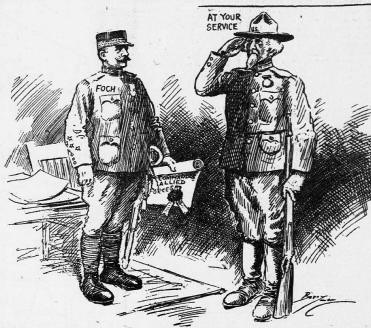 Gen. Pershing called on Gen. Foch at the French headquarters and placed the American Army at his disposal for employment in the battle now in progress.
Gen. Pershing called on Gen. Foch at the French headquarters and placed the American Army at his disposal for employment in the battle now in progress.
Gen. Pershing said, "The American people would hold it a great honor if our troops were being engaged in the present battle. I ask it of you, in my name and that of the American people. There is at this moment no other question than that of fighting. Infantry, artillery, and aviation - all that we have - are yours to dispose
of them as you will. Others are coming which are as numerous as will be necessary. I have come to say to you that the American people would be proud to be engaged in the greatest battle in history."
The presence of American auxiliary troops on the fighting line in the great battle was the subject of much favorable comment, and when it became generally known that wounded American officers and men were being brought back with the French wounded, the American stock rose high. The morale effect was considerable, even though
the supposition was that the number of American troops in the line was not considerable. The French take comfort in the Americans’ willingness to take part, even a small part, in the fighting.
Read past editions of News Reports From the Front